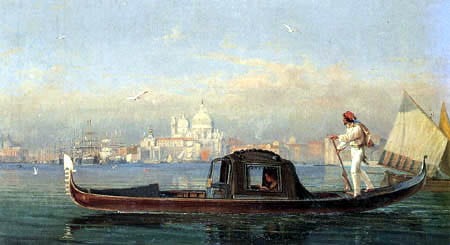Prof David Laven (University of Nottingham) will talking us on:
‘Amedeo, Angelo, and Antonio: agency, allure and annuities. Gondoliers, British gay men, and the economics of homosex in Venice in the late nineteenth and early twentieth centuries’
This paper looks at a number of well-known British men (Horatio Brown, John Addington Symonds, Frederick Rolfe) who, in the late nineteenth and early twentieth centuries, bought sex in Venice. There has been something of a historiographical tradition – typified by the work of Robert Aldrich – of suggesting the Italian boys and young men who sold their bodies to older north European men regarded their ‘patrons’ benignly and with affection. There is another widespread approach to prostitution that sees it as entirely exploitative. In this paper, I want to suggest another model. I propose an interpretation of the sale of sex by Venetian boys and men to visiting or resident Britons based on the – unsurprising – starting point that it was an essentially economic transaction in which those selling the sex had considerable agency. They were not merely passive victims of exploitation, but rational economic agents, albeit ones with an often limited range of choices. What they were selling, however, was not simply physical gratification but also the chance to transcend class and cultural barriers, offering an understanding of a Venice as a simultaneously exotic and domestic place. British clients sought not simply penetration of the body, but penetration of venezianità. Relationships between British punters and Venetian men – often gondoliers who came to represent an ideal of masculine beauty – who prostituted themselves also built on an imaginary of Venice as a site of hetero-erotic excess, which referenced both art (from Titian to Fildes) and literature (Aretino, Casanova, Byron). I hope my paper will both puncture the Aldrichian myth of the ‘happy rentboy’ – the narratives of love and affection and mutual gratification were artful constructs – and restore some agency to the Venetian men who sold their bodies.
Biography
David Laven is Associate Professor of History at the University of Nottingham. He has held positions in both early modern and modern history as well as in Italian Studies, and has published on Italian history from the late fifteenth to the twentieth century. The focus of his work at present is on the way in which historians – Italian, British, German and Austrian, Swiss, French and American – writing on the Venetian Republic in the 150 years after its fall negotiated questions of identity when addressing Venice’s past. He has also published extensively on Austrian rule of Venice, on Italian identity in the Risorgimento and Liberal period, on British attitudes to Italy. He is engaged heavily in contemporary Italian struggles to challenge state-fostered myths of the Risorgimento as a successful mass movement. He is additionally involved in a project to reclaim the history of southern Italy’s industrial heritage, while addressing the imbalance in Italy’s UNESCO sites which are disproportionately and absurdly clustered in a few regions.
